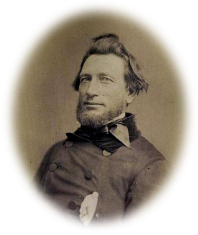Wednesday, 17th.–A day of momentous events. The battle of Antietam is fought. I had before been near battles, at battles, in battles; but never till to-day was I through a battle. For miles around me, it has been one continuous battle field. Look where I would, and when I would, the battle was all around me. Since Friday last, this series of battles has been growing harder and harder. Today, both parties were reinforced to about one hundred thousand men each, and the battle has been terrible, but there is nothing decisive. We hold most of the ground held by the enemy in the morning, but the parties lie on their arms in sight of each other, ready to renew the slaughter with the coming of light. So terrible has been the day; so rapid and confused the events, that I find it impossible to separate them, so as to give, or even to form for myself any clear idea of what I have seen. I hope it will be different when the mind has accustomed itself a little to thinking over the events and the horrors of the scene. Many illustrious dead will be counted to-night, and, oh! how many sad hearts to-morrow, and how many to-morrows of sadness. Amongst the sufferers, I hear that Generals Mansfield and Richardson are mortally wounded. Surgeon White, Medical Director of General Franklin’s Corps, is killed. Poor fellow, the excitement of the battle upset his intellect. He applied to the General for a regiment to dislodge the rebels from a wood in our front. The General replied that his whole corps could not do it. Then said the Surgeon, “I must do it myself,” and putting spurs to his horse, dashed off for the woods. Before reaching it, he of course was shot and killed.
As for myself, I feel that I have relieved much suffering to-day. I have shed many tears, too, over the distresses of both loyal and rebel men. As I approached one poor fellow, a Georgia rebel, lying wounded on the field, he was hiding something from me. I took it from him, and on unfolding it, found it to be a photograph of wife and children. I raised him up to look at it, and our tears mingled over the shadows of his loved ones, whose substance neither of us is ever likely to see. How easy the gradation from sympathy to affection. I am getting to love these suffering rebels. * * I wish I could describe something of the scenes of to-day, but cannot. They are all indistinct to me. Perhaps some day I shall be able, from these notes, to give them shape in my journal.
At 9 o’clock to-night, an officer, a confidential friend of General McClellan, rode along the lines, and said that the General promises us an infantry fight to-morrow. This means a hand to hand fight, when the best army must prevail and a decisive result occur. There is great rejoicing thereat amongst our troops. They say, here we are, both armies in force. Let us now come together and settle this war. If they can whip us, why not let us die like soldiers, and end the war. If we are the stronger party, why delay? Let us destroy them, close the strife, and return to our homes. Loud huzzas and hosannas for McClellan resound along the lines to-night. Should he destroy this army tomorrow he will be the biggest man in America, and will have merited the title of the Young Napoleon. How rejoiced I shall be to find that all my censures of him are unfounded!
Our wounded have suffered much to-day for want of chloroform. I think that not over three or four surgeons on the field had a supply. I saw but two who had. Why will surgeons permit themselves on a campaign like this to be without the necessary articles of comfort for the wounded? The few pounds on hand were exhausted in less than three hours. The men lay suffering from their wounds, and in many instances surgeons were operating without it. Government teams had not come up. What could we do? In this dilemna, at the very right moment, in stepped Mrs. Harris, of Philadelphia, with the announcement that she had just arrived with twenty pounds of chloroform from the U. S. Sanitary Commission. What an angel of mercy is this Mrs. Harris! What a source of ever present comfort and well directed effort is that Sanitary Commission! The soldiers of this army will have cause of prayer for it in their living and in their dying hours.
